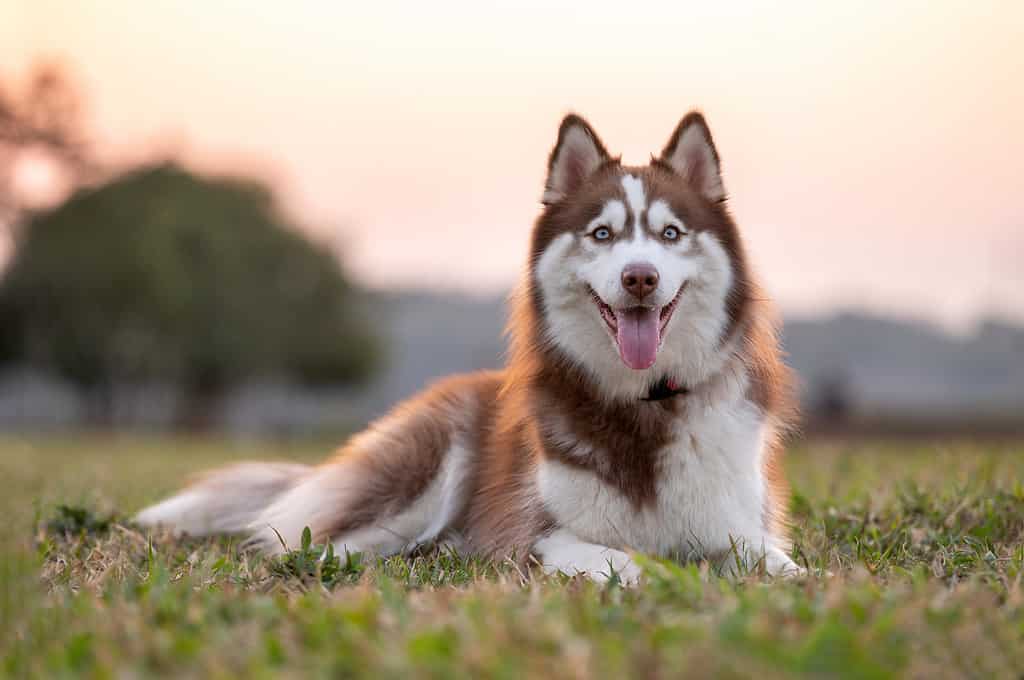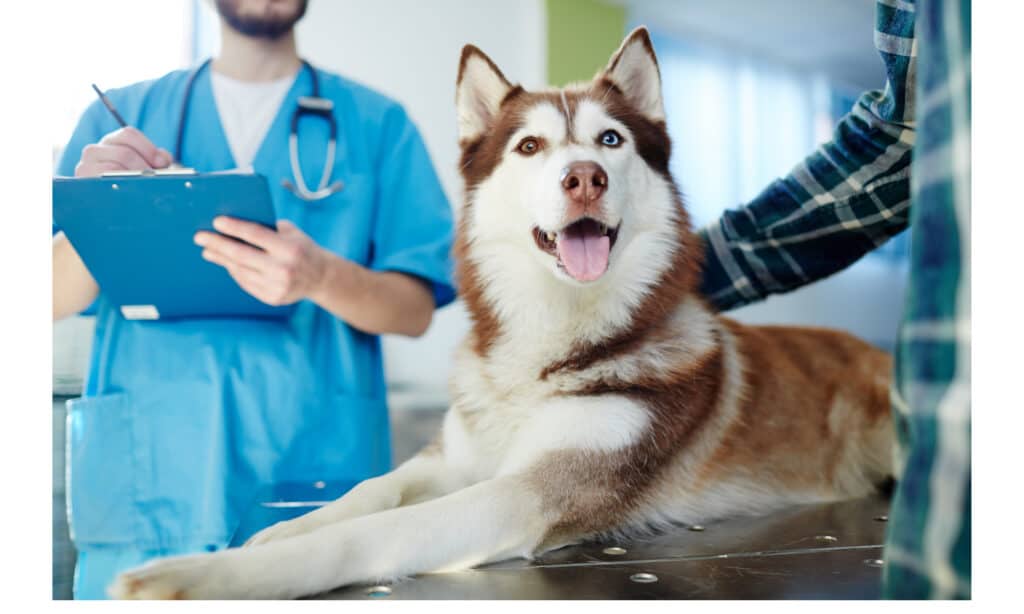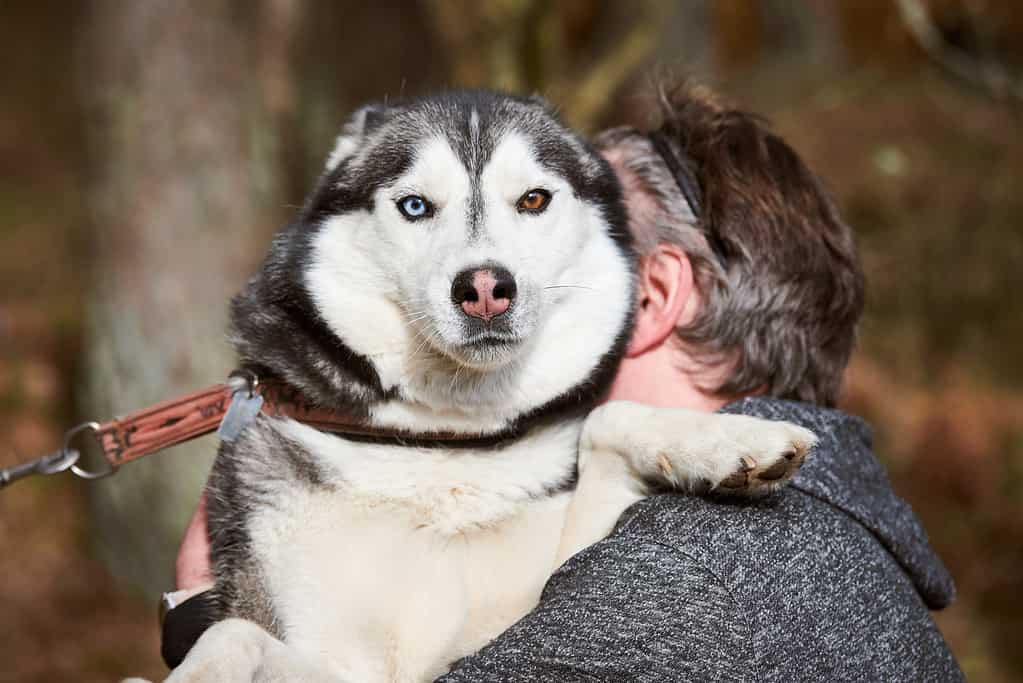All dogs howl from time to time, but there’s one dog breed that is known for howling more than any other – the Husky. The Husky is incredibly vocal and sports an outgoing personality, so this often leads to a whole lot of howling. But why does the Husky howl so much?
In this article we will introduce you to seven reasons why your Husky howls so much, and some of the most effective ways to limit their howling.
Let’s get started!
What Is Howling, Anyways?

Howling is an ancient method of communication for our canine companions.
©iStock.com/Elayne Massaini
Before we discuss the potential reasons why your Husky is always howling, it’s important to understand the howling behavior in itself. Howling is an ingrained behavior that our dogs have inherited from their wolf ancestors. Instead of a standard bark that is often short and to the point, a howl is typically loud and extended, often making it audible across long distances.
Wolves used howling as a way to communicate their whereabouts with the rest of their pack and scare off any unwanted invaders. While our canine family members may not have an entire animal pack to communicate with, they still engage in the howling behavior. The desire to howl is essentially ingrained in their DNA, especially in a breed as vocal as the Husky.
Dr. Amy Nicole Lewis, a veterinarian with Worldwide Veterinary Services told A-Z Animals that dogs often use howling to communicate with their pack, and their pack can be their family. They may use howling to alert you of anything from strange noises outside to other dogs in the area, as they are simply trying to keep their pack members in the loop at all times.
7 Reasons Why Huskies Howl So Much

Wolves used howling as a way to communicate their whereabouts with the rest of their pack and scare off any unwanted invaders.
©Pressmaster/Shutterstock.com
Huskies are known for being very vocal, but there are certain factors that can trigger a howling episode in these furry friends. Let’s break down the potential reasons why your Husky is howling below.
#1 They Hear Another Dog Nearby
Many Huskies will howl if they hear another canine companion nearby. Howling is an ancient method of communication used by wolves, often to inform other wolves about their current whereabouts. Not only would wolves howl to let their pack members know where they were, but they would also howl to tell other wolves to stay away from their territory. Your Husky may howl if they sense another dog nearby for these reasons!
#2 They Hear Noises Around Your Home
Strange noises can easily trigger a howling episode in your Husky. Sounds that are known to incite howling in a Husky can include sirens, doorbell rings, passing cars, people walking by your home, and more. Your Husky may see these strange noises as a potential threat, sending them into a howling spiral to notify everyone in your home.
#3 They Are Alerting You Of A Potential Intruder
Your Husky may howl if they think there is a potential intruder around your home. Our dog’s ancestors would rely on howling to alert members of their pack of a potential threat nearby, so your Husky may howl if they think you could be in any danger. Huskies may howl if they hear anyone or anything moving around your home, whether they are truly dangerous or not. This could include an actual threat around your property, or even harmless visitors like the mailman or neighborhood friends.
#4 They Are Bored And Want To Play
A bored Husky may howl when they want to play. Howling often gets the attention of the pet owner, so your Husky may bark or howl to try to get you to engage in play. If your canine friend always runs to their favorite toy after a howling episode, then they may just want to play with their favorite person.
#5 They Are Anxious About Something
Huskies are known to struggle with canine anxiety. Separation anxiety is one of the most common forms of anxiety seen in Huskies, often leading to excessive howling anytime they are separated from their owners. Huskies can develop separation anxiety due to the sudden absence of an owner, being left alone for long periods, lack of adequate exercise, a change in their normal routine, and any other change that can lead to stress.
#6 They Are Overwhelmed With Happiness
One of the most lovable Husky traits is their unique personality. Huskies often vocalize their every emotion, and this includes happiness! Your happy Husky pup may howl and whine when they are overjoyed or filled with excitement. This can occur when you get home from work, during playtime, right before meal times, and any other event that brings your Husky joy.
#7 They Do Not Feel Well
Just as the Husky is known to vocalize when they are happy, they may also howl if they are feeling unwell. Your Husky may also experience other changes in behavior such as decreased energy, changes in appetite, disinterest in things they usually enjoy, and any other changes in their normal behavior. If you notice any strange changes in your Husky along with their increased howling, then we suggest having your Husky assessed by a veterinarian.
How To Get My Husky To Stop Howling

You can limit excessive howling in Huskies by increasing their daily exercise, having a structured daily routine, limiting the time they are left alone each day, and trying to desensitize them to their howling triggers.
©iStock.com/TRAVELARIUM
All Huskies will howl or vocalize from time to time, but some Huskies may struggle with excessive and bothersome howling. Let’s offer some tips on how to get your Husky to stop howling all the time.
Increase their daily exercise: A bored Husky is much more likely to participate in excessive howling and other bothersome behaviors. Huskies are a highly energetic breed that need at least 45 minutes of daily exercise, so if your howling Husky is not getting this, this could be the cause of their undesirable behavior. We suggest taking your Husky on long walks, playing interactive games, taking them along on hikes, and any other form of exercise your Husky enjoyed.
Try not to leave them alone for extended periods: Huskies are one of the breeds that struggle most with being left alone for long periods. Huskies often struggle with being left alone for more than 6 hours, so if you do need to leave your home for extended periods, it may be best to have someone stop by and pay your little one a visit. Huskies thrive with a dog walking service if they have busy pet parents!
Work on socialization: Socialization can be helpful for Huskies that are always howling at unfamiliar sounds or people walking by your home. The more they are exposed to the trigger that causes their howling, the less inclined they will be to bark at it. Socialization or Huskies may include introducing them to new people, arranging play dates with new dogs, having people visit your home, and taking them to public spaces with new sights and sounds. Just be sure that your Husky is up to date on their vaccines before taking them to public spaces.
Try to reduce stress: Limiting stress can cut back on excessive howling in Huskies. This can include sticking to a set daily routine for feeding and exercise, avoid leaving your Husky alone for long periods, making sure they have plenty of mental and physical stimulation each day, and having them assessed by a vet promptly if they are feeling unwell.
Final Thoughts On Howling Huskies
You should always expect a bit of howling if you are a proud Husky parent. However, if your Husky is struggling with excessive howling, then be sure to implement the tips we discussed above on how to stop excessive howling in your canine companion.
The photo featured at the top of this post is © iStock.com/KM Photography
Ready to discover the top 10 cutest dog breeds in the entire world?
How about the fastest dogs, the largest dogs and those that are -- quite frankly -- just the kindest dogs on the planet? Each day, AZ Animals sends out lists just like this to our thousands of email subscribers. And the best part? It's FREE. Join today by entering your email below.
Thank you for reading! Have some feedback for us? Contact the AZ Animals editorial team.






